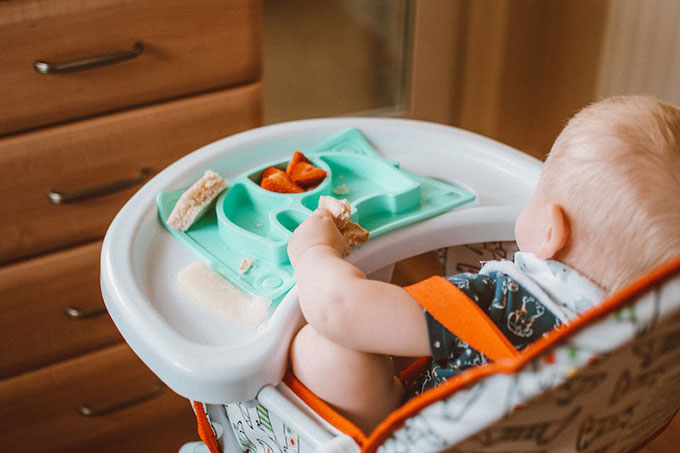
Finding the best food for a baby is something that needs a lot of thought. What baby eats in the early days will enhance its general health, growth and development in just about every way. There are many baby food manufacturers in the market, so where do you start looking?
The main distinction between baby foods is this: do you feed your baby regular off the shelf baby food, or do you choose to go down the organic route? Many parents have opted to go organic as there is now more choice than ever before, and some interesting variety in food, flavours and ingredients.
In this article we look at the benefits of organic baby food over regular options, and we will also be taking a look at two of the leading organic baby food brands in the market. Let’s start by talking about why many people are choosing the organic food for their babies and young children.
Benefits of Organic Baby Food
The benefits of organic food don’t stop with babies, but at this early stage of their development there can be certain advantages in feeding babies food that has been grown in the organic fashion. Babies are very sensitive to the environment around them and this extends to the food they eat, so let’s list some of the obvious benefits in feeding babies organic food:
- Crops grown regularly are fed with pesticides and fertilizers. These can include compounds that may be harmful, especially to a baby. Heavy metals, chemicals, and other toxins that are used in pesticides and fertilisers find their way into the soil and into the plants. Organically grown food uses no artificial or chemical additives, so baby will be far less likely to be exposed to harmful substances.
- Research has shown that babies and young children who eat an organic diet are more likely to enjoy healthy living. It is believed that organic food results in lower chances of respiratory problems, wheezing for example, and aids the development of the children to a notable extent.
Physical health takes a direct line of influence towards mental health. Children eating a balanced organic diet are shown to be less likely to develop ADD, depression and problems with concentration. The nutrients in organic food are good for cognitive performance too.

The above are some of the direct effects health-wise that an organic baby diet may bring to the table. In addition we have to consider the environmental influence of non-organic farming and pesticides, which is strong and problematic.
Before we move on to look at our two popular organic baby food brands, there’s one more benefit: being free of artificial additives from seed to harvest, organic food tastes better, and that applies to baby food as much as it does to that for adults.
Next, we’re going to talk about two of the best-known organic baby food brands – Little Spoon and Yumi – and for your information here’s an interesting article comparing the two baby food brands we believe will come in helpful. Let’s start with a more detailed look at Little Spoon.
Little Spoon Organic Baby Food
As we now know there is a lower risk of pesticide contamination with organic baby food and both of these brands are very big on this. We should explain that both Little Spoon and Yumi are delivery services. That means that you order from a menu, and they deliver set meals ready for baby to eat. This has added advantages in that you know exactly what your meal plan is, and both brands use specialist dieticians to compose and create their meals and menus. Let’s list some of the features of Little Spoon so we can compare them to those from Yumi:
- Delivery of meals is every two weeks with Little Spoon.
- There is a choice of pureed food for babies, plus also meals for older children.
- Little Spoon offers a rotating menu with meals for up to 10 years old.
- All packaging is recyclable.
- Additional products include a range of vitamins for babies and also natural remedies.
- Prices start at $2.74 per meal with a $5 flat rate for each delivery.
- Customer service is excellent and Little Spoon has a great online community.
- All meals are devised by nutritionists.
The above brings to light a further benefit of organic baby food delivery services: the cost. It may be cheaper to subscribe than to make your own meals or even buy off the shelf, and the convenience element is also a draw. Now let’s look at Yumi.
Yumi Organic Baby Food
A similar concept to Little Spoon, Yumi is one of the more established of the baby food delivery services, so let’s see how it compares:
- Yumi offers weekly deliveries.
- In addition to pureed baby food Yumi offers finger foods suitable for toddlers.
- A weekly menu is published suitable for children up to age 2.
- All packaging is recyclable.
- Prices start at $3.75 per meal and delivery is free.
- Yumi can only be contacted by email and does not have an active online community.
- All meals are devised by nutritionists.
From the above you can see the slight differences in concept and service between Little Spoon and Yumi, but is baby food meal delivery the answer for you? Let’s see if we can sum things up.
Conclusion
The organic baby food delivery service is clearly an idea that has struck a chord with many families of young babies, toddlers and growing children (there are other services that cater for up to young teens and beyond) who are leading busy lives and trying to make ends meet. There is no doubt that the answer to the title question is yes, organic baby food is a better choice than regular for the reasons we have described and more. Why not check out the two brand we have looked at and others, and see which one appeals to you.




Leave a Reply